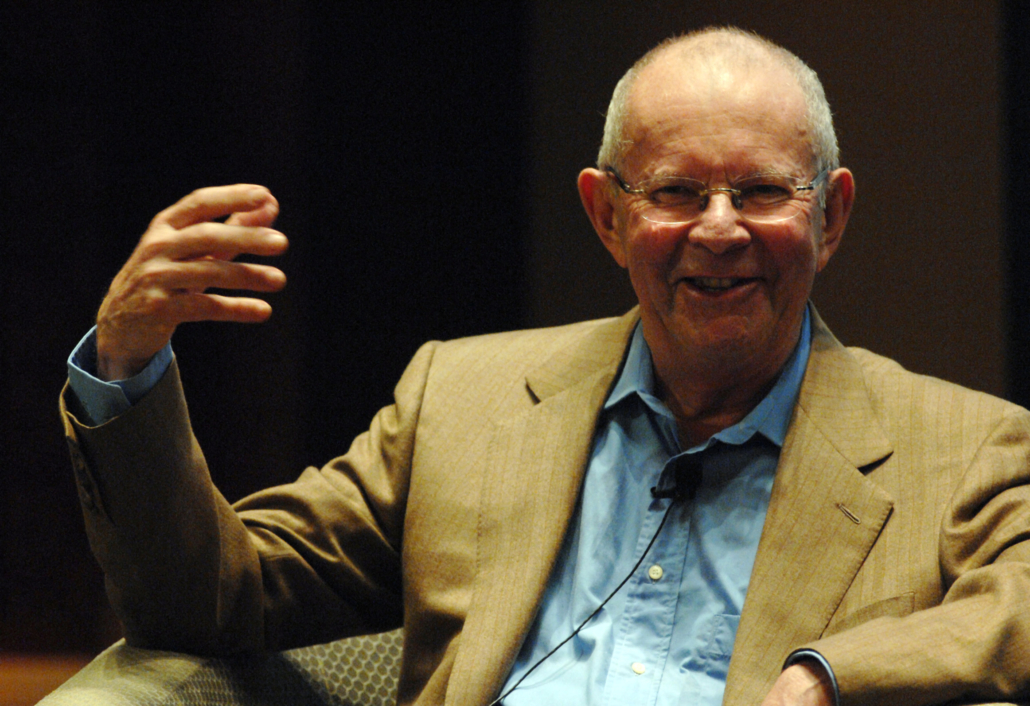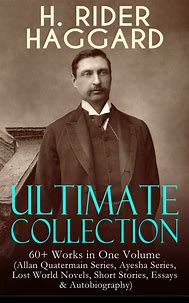LATE WRITER WAS ONCE A SECRET READER
LATE WRITER WAS ONCE A SECRET READER
Norman Warwick learns from The Washington Post
I have an uncle, Bill Bell, who un like anyone else on my side of the family is a man of the land. He is a man of spades and axes and animals and rifles and foxes and fences and a keeper of bees. He is in his eighties now, and my wife Dee and I and our son Andrew, too, have enjoyed scores of summer breaks on the small-holding Yorkshire that he and my Aunty Marlene run each one having its own little adventure. dragging fallen trees off the tracks, taking two or three hives up top the hills in the dead of night, and hoping the bees wouldn´ t wake, birthing lambs and baling. Until very recently I don´t think i had ever seen Bill sit down. I had certainly never seen him read a book, but having been given a novel by his son Craig, Uncle Bill has over the past few years become a huge fan of Wilbur Smith. Bill will be saddened to learn that this writer of such swashbuckling adventures has passed away.
Harrison Smith (no relation to the author) was one of the first journalists to announce the death of novelist Wilbur Smith. Writing in The Washington Post he said.

´Wilbur Smith, whose swashbuckling adventure novels and historical thrillers examined lust, greed and violence — usually in the hills and savannas of southern Africa — and made him a fixture of bestseller lists around the world, died on November 13th 2021 at his home in Cape Town, South Africa. He was 88.
His passing was announced in a statement on his website, which did not give a cause of death.
Mr. Smith’s novels were filled with bloodshed, bodice ripping and exotic settings, transporting readers to the pyramids of ancient Egypt, a salvage ship in the frigid South Sea and elephant hunts in Zimbabwe. While his books were usually only modestly successful in the United States, they were translated into some 30 languages and found a devoted audience in Britain and Italy, selling more than 140 million copies worldwide.
A former accountant who drafted his first novel on tax forms, Mr. Smith wrote roughly a book a year, drawing inspiration in part from his own life. He survived cerebral malaria as a new-born and polio as a teenager, trekked across the desert on a camel and encountered Somali pirates near a private island he bought in the Seychelles. He said he was charged by elephants and crocodiles, and at age 13, he shot his first lion — or rather three lions, by his telling, after they attacked a herd of cattle on his father’s ranch in Northern Rhodesia´.

´Africa is a savage place and always has been´, he told Britain’s Daily Express in 2009, using typically sweeping language to describe the continent where he was raised. ´It’s a place of conflict. And my dad looked upon the wilderness as something that should be tamed. He was the one who taught me to hunt. So there’s a lot of blood in my books. There is also a lot of interplay between the sexes. That’s what life is all about´.

To many of his fans, his books were a raucous celebration of blood-stained masculinity and a throwback to the work of English authors like H. Rider Haggard, whose adventure novel King Solomon’s Mines helped spur Wilbur´s childhood obsession with reading. Detractors accused him of promoting racial stereotypes and noted that he often glorified British imperialism, celebrating White hunters, soldiers and settlers who took up arms against Black Africans and rival Europeans.
´These men had a very strong paternalistic instinct´, Wilbur Smith told the Age, an Australian daily, in 2005. ´They thought they were doing what was best. Colonialism under the British was an altruistic doctrine. . . . It was a process of maturing. It had its place, but now the time is passed. I’m writing about those type of men — Victorian explorers, hunters, traders´.
His protagonists frequently found themselves scrambling to get out of trouble and then falling into bed, embracing women whose bones “went soft with desire” and whose loins “melted like wax.”

British Prime Minister Boris Johnson once recalled that among his fellow students at Eton, Mr. Smith was “venerated for his dog-eared sex scenes.” By many accounts, women made up a larger share of his audience than men.
´I enjoy sex´, Mr. Smith once said. ´I enjoy writing about it and I enjoy thinking about it´.
Many critics said his novels were stilted, repetitive and cartoonish, even as they acknowledged he could be a gripping storyteller. As Mr. Smith told it, he was “writing stories,” not great literature. He said he re-read his novels with pleasure, finding no room for improvement, and told Britain’s Sunday Telegraph that he was a bit like the hero of his novel River God (1993), which kicked off a series about ancient Egypt.
´I think that Taita is like me´, he said. ´He doesn’t admit failure. Even if he has failed´.
Wilbur Addison Smith was born in Broken Hill, Northern Rhodesia — now Kabwe, Zambia — on Jan. 9, 1933. His mother painted water-colours and encouraged his interest in reading, while his father ran a sheet-metal factory and then a ranch and insisted that his son focus on more practical matters.
´I was forced to become a secret reader´, Mr. Smith wrote in a biographical essay. ´I spent so much time in the outhouse long-drop latrine, where I kept a cache of my favorite books, that my father ordered my mother to administer regular and copious doses of castor oil´.
Mr. Smith studied at boarding schools in South Africa and graduated from Rhodes University in Grahamstown, now known as Makhanda, in 1954. He dreamed of becoming a journalist or professional hunter, but when his father told him he would “starve to death,” he became an accountant instead. In his spare time, he wrote a novel.
´It was a piece of rubbish´, he later recalled. ´I made all the mistakes of a first novelist. I had more characters in the book than ‘War And Peace,’ and I pontificated on politics´.
On his second try, he dropped politics and focused instead on ranching, gold mining, ivory hunting and the Anglo-Zulu War of 1879. The result, When The Lion Feeds (1964), became a bestseller and introduced readers to the Courtney family, which he followed over multiple generations and more than a dozen novels. He later chronicled the history of another fictional family, the Ballantynes, beginning with A Falcon Flies (1980); wrote about an archaeological dig in The Sunbird (1972); and created one of his first female protagonists for The Burning Shore (1985), about a nurse during World War I.
Several of his novels were adapted into movies, including Dark Of The Sun (1968), about a band of mercenaries hunting for diamonds during the Congo Crisis; Gold (1974), which starred Roger Moore as the general manager of a South African mine; and Shout At The Devil” (1976), with Moore and Lee Marvin, who became a fishing buddy.
Mr. Smith’s publishing deals were widely publicized in Britain, as was his tumultuous personal life; some of his children and stepchildren said he neglected and abandoned them. ´I can be hard. I don’t want to be, but I don’t like being hurt´, the writer said in a 2015 interview with the Sunday Times of London. ´They were important to me at one point, make no mistake — very important — but not now. It’s sadder for them than it is for me, because they’re not getting any more money´.
He had two children from his first marriage, to Anne Rennie — “He definitely, definitely felt he was wasted on one woman,” she later said — and a son from his second marriage, to Jewell Slabbart. In 1971, he married Danielle Thomas, who died of brain cancer in 1999. The next year, he married Mokhiniso “Niso” Rakhimova, who was from Tajikistan and trained as a lawyer. They met at a London bookshop, where he saw her browsing a shelf of John Grisham novels and steered her toward his own work. She was 39 years his junior.
´She was young, in her early 20s´, Mr. Smith told the Sunday Times, ´and I was as randy as a stallion in a ranch full of mares´. They later founded the Wilbur and Niso Smith Foundation, which supports young and aspiring writers. Information on survivors was not immediately available.
Late in his career, Mr. Smith began to farm out some of his writing, signing a reported $24 million deal with HarperCollins in 2012 under which he would supervise six novels and work at times with co-authors. Mindful of his mortality, he had insisted on churning out books until his death, telling the Daily Express, ´I know somewhere ahead there is a great brick-red wall, but when I get there I want to be going at full speed with my foot on the accelerator´.

The primary source for this article appeared in The Washington Post, attributed to Harrison Smith, Obituary writer, Obituary writer. Washington, D.C.

Harrison (left) studied at the: University of Chicago, gaining AB in English and philosophy
He has worked on The Washington Post’s obituaries desk since 2015. He covers people who have made a significant impact on their field, city or country — a group of the recently deceased that includes big-game hunters, single-handed sailors, fallen dictators, Olympic champions and the creator of the Hawaiian pizza. He previously worked for KidsPost and contributed to Washingtonian and Chicago magazines, among other publications. He co-founded the South Side Weekly newspaper in Chicago before moving to the District in 2015.
In our occasional re-postings Sidetracks And Detours are confident that we are not only sharing with our readers excellent articles written by experts but are also pointing to informed and informative sites readers will re-visit time and again. Of course, we feel sure our readers will also return to our daily not-for-profit blog knowing that we seek to provide core original material whilst sometimes spotlighting the best pieces from elsewhere, as we engage with genres and practitioners along all the sidetracks & detours we take.
This article was collated by Norman Warwick, a weekly columnist with Lanzarote Information and owner and editor of this daily blog at Sidetracks And Detours.
Norman has also been a long serving broadcaster, co-presenting the weekly all across the arts programme on Crescent Community Radio for many years with Steve, and his own show on Sherwood Community Radio. He has been a regular guest on BBC Radio Manchester, BBC Radio Lancashire, BBC Radio Merseyside and BBC Radio 4.
As a published author and poet he was a founder member of Lendanear Music, with Colin Lever and Just Poets with Pam McKee, Touchstones Creative Writing Group (where he was creative writing facilitator for a number of years) with Val Chadwick and all across the arts with Robin Parker.
From Monday to Friday, you will find a daily post here at Sidetracks And Detours and, should you be looking for good reading, over the weekend you can visit our massive but easy to navigate archives of over 500 articles.

The purpose of this daily not-for-profit blog is to deliver news, previews, interviews and reviews from all across the arts to die-hard fans and non- traditional audiences around the world. We are therefore always delighted to receive your own articles here at Sidetracks And Detours. So if you have a favourite artist, event, or venue that you would like to tell us more about just drop a Word document attachment to me at normanwarwick55@gmail.com with a couple of appropriate photographs in a zip folder if you wish. Beiung a not-for-profit organisation we unfortunately cannot pay you but we will always fully attribute any pieces we publish. You therefore might also. like to include a brief autobiography and photograph of yourself in your submission. We look forward to hearing from you.
Sidetracks And Detours is seeking to join the synergy of organisations that support the arts of whatever genre. We are therefore grateful to all those who share information to ensure it reaches as wide and diverse an audience as possible.
correspondents Michael Higgins
Steve Bewick
Gary Heywood Everett
Steve Cooke
Susana Fondon
Peter Pearson
Hot Biscuits Jazz Radio www.fc-radio.co.uk
AllMusic https://www.allmusic.com
feedspot https://www.feedspot.com/?_src=folder
Jazz In Reading https://www.jazzinreading.com
Jazziz https://www.jazziz.com
Ribble Valley Jazz & Blues https://rvjazzandblues.co.uk
Rob Adams Music That´s Going Places
Lanzarote Information https://lanzaroteinformation.co.uk
all across the arts www.allacrossthearts.co.uk
Rochdale Music Society rochdalemusicsociety.org
Lendanear www.lendanearmusic
Agenda Cultura Lanzarote
Larry Yaskiel – writer
The Lanzarote Art Gallery https://lanzaroteartgallery.com
Goodreads https://www.goodreads.
groundup music HOME | GroundUP Music
Maverick https://maverick-country.com
Joni Mitchell newsletter
passenger newsletter
paste mail ins
sheku kanneh mason newsletter
songfacts en.wikipedia.org/wiki/SongFacts




Leave a Reply
Want to join the discussion?Feel free to contribute!